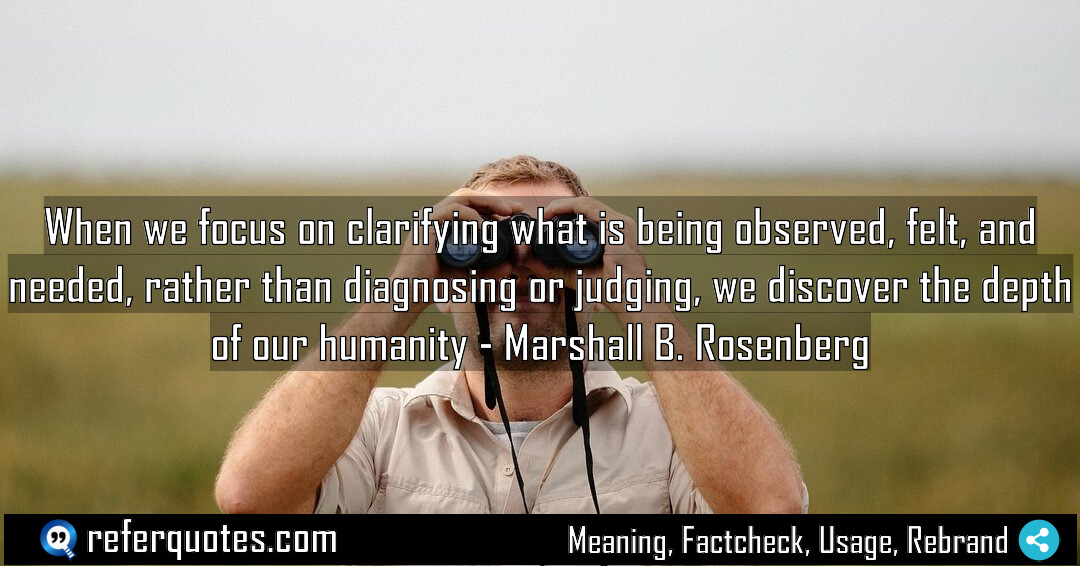
When we focus on clarifying what is being observed… we stop judging and start connecting on a human level. It’s a game-changer for communication, shifting you from automatic reactions to thoughtful, empathetic responses.
Share Image Quote:
Table of Contents
Meaning
At its heart, this quote is about swapping out our habitual, often harsh, judgments for clear, compassionate observation. It’s the difference between saying “You’re so lazy” and “I see the dishes are still in the sink.”
Explanation
Let me break this down because it sounds simple, but it’s profound. Rosenberg is giving us a framework, a kind of mental operating system. Instead of diagnosing someone as “rude” or judging a situation as “a disaster,” you train yourself to do three things. First, you just state what you’re actually observing, like a video camera. No labels. Then, you get in touch with what you’re feeling about it—are you hurt, scared, frustrated? And finally, you connect that feeling to a universal need that isn’t being met, like the need for respect or cooperation. When you do this, you stop attacking the other person’s character and start addressing the real, human situation. You discover that depth of humanity he talks about because you’re no longer in a battle; you’re in a collaboration.
Quote Summary
Reading Level85
Aesthetic Score85
Origin & Factcheck
This is straight from Marshall B. Rosenberg’s 1999 book, Nonviolent Communication: A Language of Life, which really codified his life’s work. You sometimes see similar sentiments floating around in mindfulness circles, but this specific, powerful phrasing is uniquely Rosenberg’s.
Attribution Summary
Where is this quotation located?
| Quotation | When we focus on clarifying what is being observed, felt, and needed, rather than diagnosing or judging, we discover the depth of our humanity |
| Book Details | Publication Year: 1999; ISBN: 9781892005038; Last edition: 3rd Edition (2015); Number of pages: 264. |
| Where is it? | Chapter 3: Identifying and Expressing Feelings, Page 47 (2015 edition) |
Context
In the book, this isn’t just a nice idea; it’s the core of the entire Nonviolent Communication (NVC) model. He presents it as a practical alternative to the language of domination and judgment that we’re all steeped in. He developed this through decades of mediating conflicts, from corporate boardrooms to war zones, proving its power in the real world.
Usage Examples
So, how does this work in real life? Let’s say you’re a manager and an employee misses a deadline.
- The Old Way (Judging): “You’re so unreliable. You need to get your act together.” (This creates defensiveness.)
- The NVC Way (Observing, Feeling, Needing): “When I see that the project report wasn’t submitted by the 3 PM deadline we agreed on, I feel concerned because I have a need for reliability and teamwork to meet our own commitments to the client.” (This opens a dialogue.)
Or at home with a partner: “When I see dirty clothes on the floor for the third day this week, I feel frustrated because I have a need for order and shared responsibility in our home.” See the shift? It’s actionable. This is gold for leaders, parents, teachers, coaches—anyone who needs to give feedback without burning bridges.
To whom it appeals?
Share This Quote Image & Motivate
Motivation Score85
Popularity Score80
Shareability Score80
FAQ
Question: Isn’t this just being passive and not holding people accountable?
Answer: Not at all! In fact, it’s the opposite. It’s about holding people accountable with crystal clarity, but without the blame and shame that usually shuts people down. You’re addressing the behavior, not attacking the person, which makes them far more likely to actually hear you and change.
Question: This feels really awkward and formal to say out loud.
Answer: You’re 100% right, it can feel that way at first. The goal isn’t to memorize a script. It’s to internalize the consciousness behind it. After a while, the spirit of it starts to infuse your normal language. You start thinking, “What’s my need here?” instead of “What’s wrong with them?”
Question: What if the other person doesn’t use NVC?
Answer: That’s the beautiful part—it doesn’t matter. This is primarily for you. It changes your own internal state and how you show up in the conversation. When you stop judging and start observing and expressing needs, you de-escalate the situation almost automatically, regardless of how the other person responds.
Similar Quotes
When we meet others with empathy, we transcend our judgments… It’s a game-changer because it shifts the entire dynamic of a conversation from conflict to connection. You stop seeing people…
We judge ourselves by our intentions… it’s a simple phrase that reveals a massive blind spot in how we operate. It’s the reason conflicts escalate and teams break down, because…
You know, “The more we are able to connect with what we are observing…” is really the whole game. It’s not fluffy self-help; it’s a practical framework for getting what…
Our cultural conditioning leads us to focus on judging others instead of understanding their needs. It’s a game-changer for communication, shifting you from blame to genuine connection. This insight fundamentally…
When we hear the needs of others, we realize it’s the ultimate empathy hack. It cuts through the noise and connects us on a fundamental level. This isn’t just theory;…
